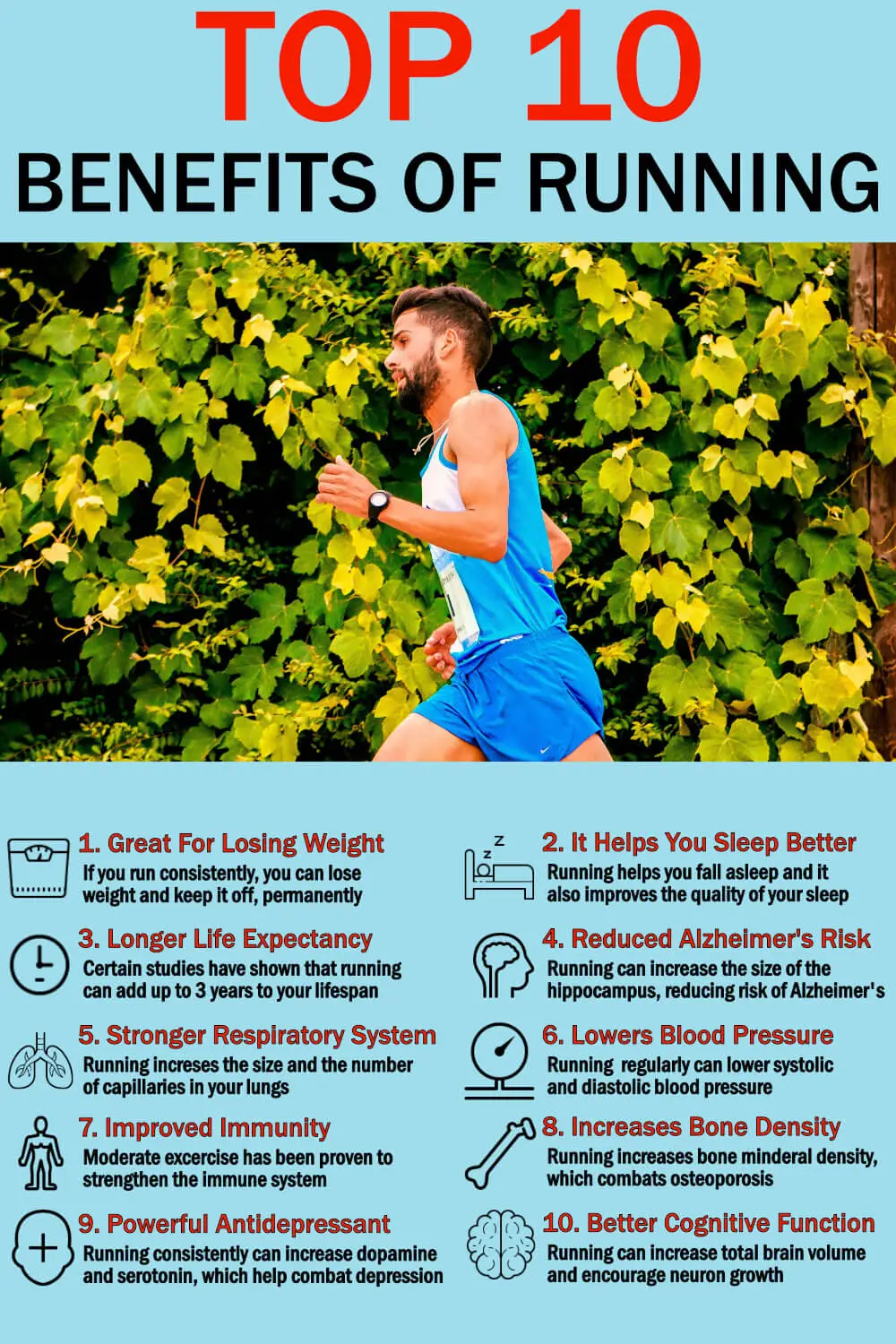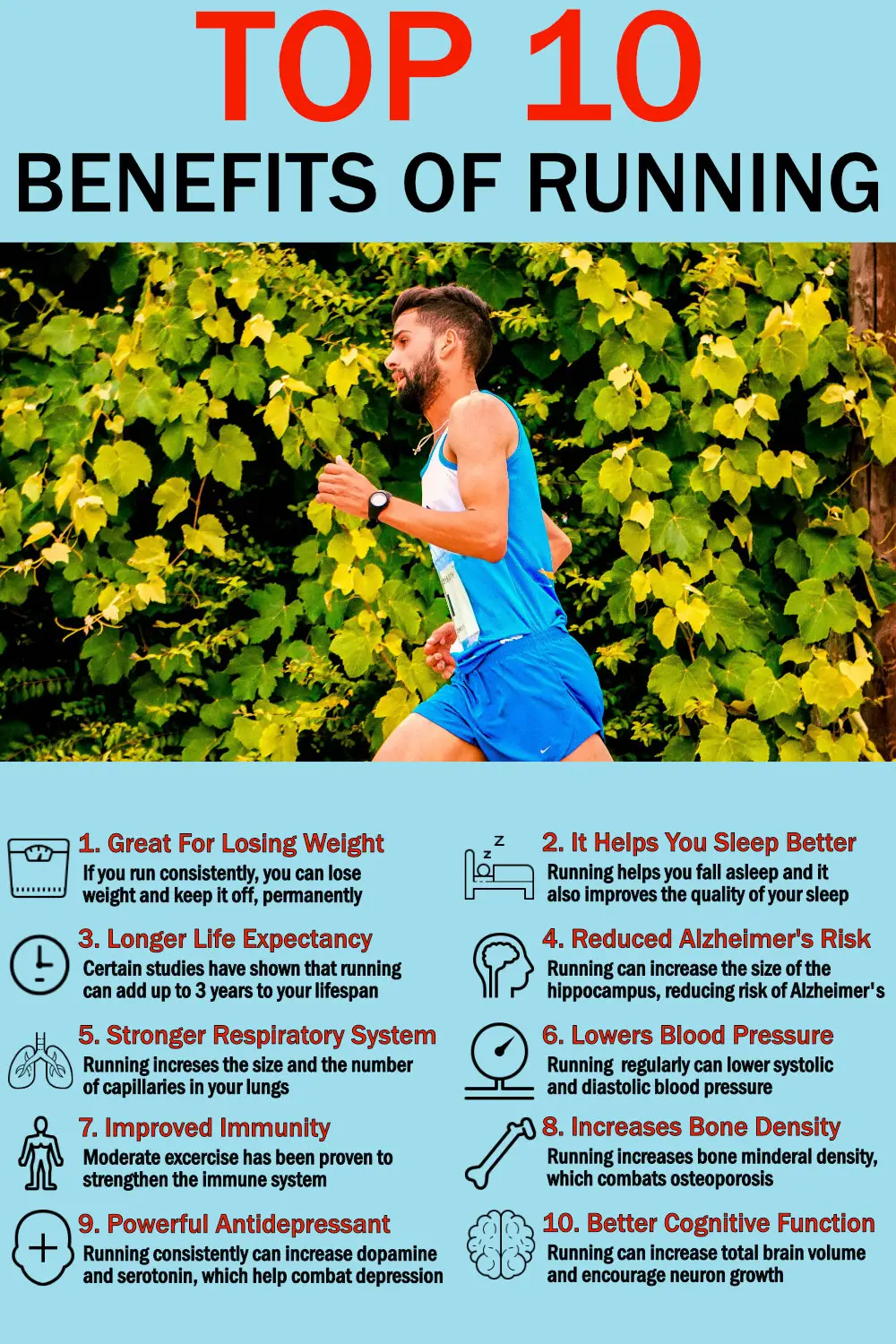Running is one of the most beneficial activities that a human being can engage in. More importantly, these benefits aren’t limited to improved cardiovascular fitness and weight-loss. They range from lowered risk of Alzheimer’s and Osteoporosis, to improved cognitive function and a stronger immune system.
In this post, we present the top 10 benefits of running, with a nice infographic summary (above).
1. Great For Losing Weight
“It is incontrovertible that exercise can and does result in weight loss“. These are the findings of Stuart M Phillips, Michael J Joyner. Their research combats the notion that you can’t outrun a bad diet (ie you definitely can), but within reason.
Perhaps more importantly, people who exercise for more than 200 minutes per week have been shown to maintain their weight loss wins for significantly longer than people who exercise for less than 150 minutes per week. In other words, running consistently can help you lose the weight, and keep it off, permanently.
2. It Helps You Sleep Better
According to experts from the John Hopkins Medical Institute, running can help you fall asleep faster, and improve sleep quality.
“We have solid evidence that exercise does, in fact, help you fall asleep more quickly and improves sleep quality,” says Charlene Gamaldo, M.D. , medical director of Johns Hopkins Center for Sleep at Howard County General Hospital.
Long story short, when you exercise, you are essentially priming your body and your mind for better sleep that evening. All you need to do is rinse and repeat this strategy for better sleep in the long run.
3. Longer Life Expectancy
Numerous studies have found that running can add years to your life expectancy. One particularly analysis even concluded that runners can potentially add 3 more years to their lifespan, provided they run once a week or more. These studies don’t bode well for non-runners.
4. Reduced Alzheimer's Risk
Studies show that people who are physically active are less likely to experience a decline in their mental function, have a lowered risk of developing Alzheimer’s disease, and possibly have improved thinking among people with vascular cognitive impairment.
In addition, regular aerobic exercise can also decrease the likelihood of experiencing dementia later in life.
5. Stronger Respiratory System
Running not only increases the size of the capillaries in your lungs, it also increase the number of capillaries. The net result is an exponential improvement in your respiratory system. This partially explains why running gets easier when you train consistently. Your lungs become better able to absorb and distribute oxygen to your body.
6. Lowers Blood Pressure
While running is not a cure for high blood pressure, it has been show to offer modest improvements in both systolic and diastolic blood pressure.
The Journal of the American Society of Hypertension found that “three months of exercise-based lifestyle intervention may produce a reduction in blood pressure of approximately 5 mmHg systolic and 3 mmHg diastolic in older individuals“.
7. Improved Immunity
Over the long term, running and other forms of aerobic exercise can encourage a healthy, anti-inflammatory environment in the body. Moreover, running has the potential to strengthen the adaptive immune system as you age, meaning a stronger and healthier immune system overall.
8. Increases Bone Density
Most people know that resistance training is great for increasing bone density. What they might not know is that running can be just as good, if not better!
A University of Missouri study found that “high-impact sports, like running, appear to have a greater beneficial effect” on bone mineral density. Therefore, if you incorporate running and resistance training into your routine, you can reduce the likelihood of Osteoporosis later in life.
9. Powerful Antidepressant
Depression is a major mental health problem that affects millions of people across the world. While each case of depression will require its own unique solution, it should be comforting to know that running can be as powerful as medication when dealing with depression.
“In people who are depressed, neuroscientists have noticed that the hippocampus in the brain—the region that helps regulate mood—is smaller. Exercise supports nerve cell growth in the hippocampus, improving nerve cell connections, which helps relieve depression,” explains Dr. Miller.
10. Better Cognitive Function
Many studies have suggested that the parts of the brain that control thinking and memory (the prefrontal cortex and medial temporal cortex) have greater volume in people who exercise versus people who don’t. This is excellent news for runners.
In essence, if you run consistently for a sustained period of time, you can literally increase the volume of several braining regions, which can result in improved learning and memory abilities, faster though processing and better decision making. Clearly then, it’s safe to say that running is good for your brain.


